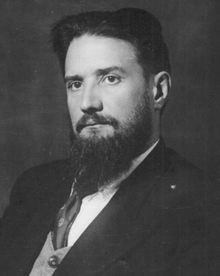
Back إيجور كورتشاتوف Arabic ايجور خرشاتوف ARZ İqor Kurçatov Azerbaijani ایقور کورچاتوف AZB Курчатов Игорь Васильевич Bashkir Ігар Васільевіч Курчатаў Byelorussian Ігар Курчатаў BE-X-OLD Игор Курчатов Bulgarian Ígor Kurtxàtov Catalan Igor Kurčatov Czech
Igor Kurchatov | |
|---|---|
Игорь Курчатов | |
 Kurchatov in 1948 | |
| Born | Igor Vasilyevich Kurchatov January 12, 1903[1] (O.S. December 31, 1902) |
| Died | 7 February 1960 (aged 57)[1] |
| Resting place | Kremlin Wall Necropolis |
| Citizenship | |
| Alma mater | Leningrad Polytechnical Institute |
| Known for | Soviet atomic bomb project |
| Awards | |
| Scientific career | |
| Fields | Physics |
| Institutions | Arzamas-16 Ioffel Physico-Technical Institute Azerbaijan Polytechnic Institute |
| Website | I.V. Kurchatov by PBS |
Igor Vasilyevich Kurchatov (Russian: Игорь Васильевич Курчатов; 12 January 1903 – 7 February 1960), was a Soviet physicist who played a central role in organizing and directing the former Soviet program of nuclear weapons,[2] and has been referred to as "father of the Russian atomic bomb".[3]
As many of his contemporaries in Russia, Kurchatov, initially educated as a naval architect, was an autodidact in nuclear physics and was brought by Soviet establishment to accelerate the feasibility of the "super bomb". Aided by effective intelligence management by Soviet agencies on the American Manhattan Project, Kurchatov oversaw the quick development and testing of the first Soviet nuclear weapon, which was roughly based on the first American device, at Semipalatinsk in the Kazakh SSR in 1949.
Kurchatov, a recipient of many former Soviet honors, had an instrumental role in modern nuclear industry in Russia. His rapid decline in health is mainly attributed to a 1949 radiation accident in Chelyabinsk-40.: 107–108 [4] Kurchatov died in Moscow in 1960, aged 57.[1]
- ^ a b c d e Igor Vasilyevich Kurchatov Archived 19 October 2020 at the Wayback Machine. Encyclopaedia Britannica
- ^ "Nuclear Files: Library: Biographies: Igor Kurchatov". www.nuclearfiles.org. Archived from the original on 5 December 2021. Retrieved 21 February 2024.
- ^ Jenks, Andrew (2014). The Cosmonaut Who Couldn’t Stop Smiling: The Life and Legend of Yuri Gagarin. DeKalb, Ill: NIU Press. p. 103. ISBN 978-0-87580-447-7.
- ^ Marcovici, Ozias (2019). Atom between Science and Politics. Lulu.com. p. 338. ISBN 978-0-359-73723-9. Archived from the original on 17 September 2023. Retrieved 4 November 2022.